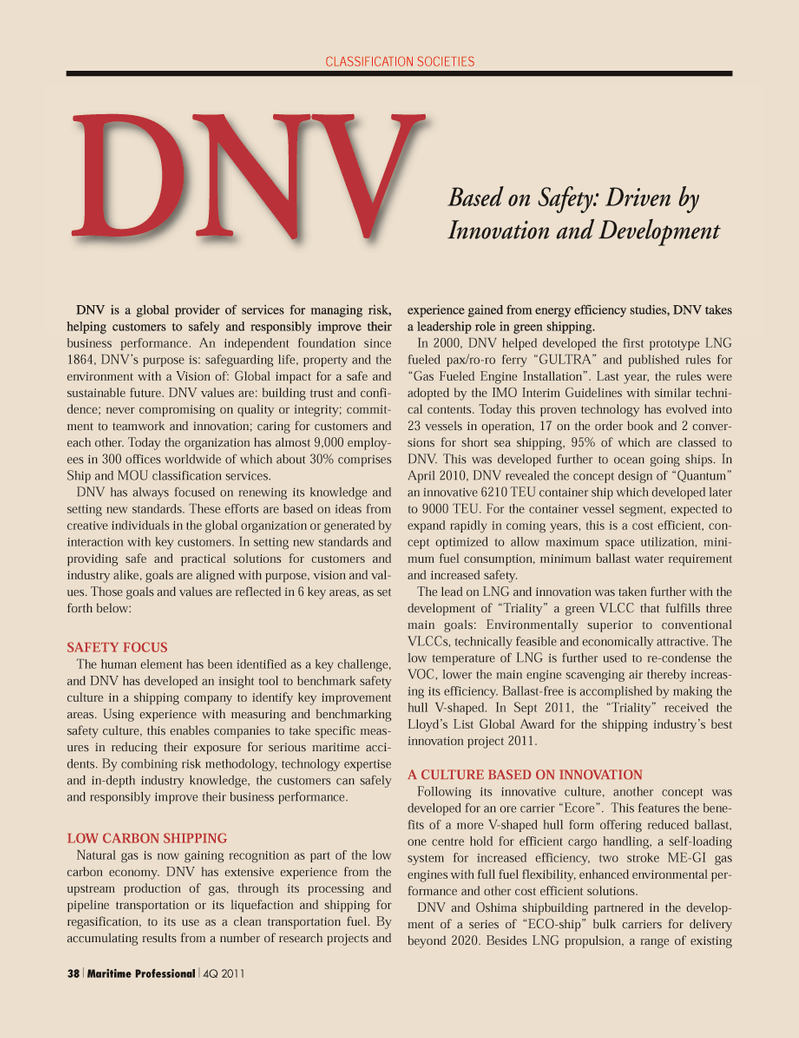
Page 38: of Maritime Logistics Professional Magazine (Q4 2011)
Classification
Read this page in Pdf, Flash or Html5 edition of Q4 2011 Maritime Logistics Professional Magazine
38 Maritime Professional 4Q 2011DNV is a global provider of services for managing risk, helping customers to safely and responsibly improve their business performance. An independent foundation since 1864, DNV?s purpose is: safeguarding life, property and the environment with a Vision of: Global impact for a safe and sustainable future. DNV values are: building trust and confi- dence; never compromising on quality or integrity; commit- ment to teamwork and innovation; caring for customers and each other. Today the organization has almost 9,000 employ- ees in 300 offices worldwide of which about 30% comprises Ship and MOU classification services. DNV has always focused on renewing its knowledge and setting new standards. These efforts are based on ideas from creative individuals in the global organization or generated by interaction with key customers. In setting new standards and providing safe and practical solutions for customers and industry alike, goals are aligned with purpose, vision and val- ues. Those goals and values are reflected in 6 key areas, as set forth below: SAFETY FOCUSThe human element has been identified as a key challenge, and DNV has developed an insight tool to benchmark safety culture in a shipping company to identify key improvement areas. Using experience with measuring and benchmarking safety culture, this enables companies to take specific meas- ures in reducing their exposure for serious maritime acci- dents. By combining risk methodology, technology expertise and in-depth industry knowledge, the customers can safely and responsibly improve their business performance. LOW CARBON SHIPPING Natural gas is now gaining recognition as part of the low carbon economy. DNV has extensive experience from the upstream production of gas, through its processing andpipeline transportation or its liquefaction and shipping for regasification, to its use as a clean transportation fuel. By accumulating results from a number of research projects andexperience gained from energy efficiency studies, DNV takes a leadership role in green shipping.In 2000, DNV helped developed the first prototype LNG fueled pax/ro-ro ferry ?GULTRA? and published rules for ?Gas Fueled Engine Installation?. Last year, the rules were adopted by the IMO Interim Guidelines with similar techni-cal contents. Today this proven technology has evolved into 23 vessels in operation, 17 on the order book and 2 conver- sions for short sea shipping, 95% of which are classed toDNV. This was developed further to ocean going ships. In April 2010, DNV revealed the concept design of ?Quantum? an innovative 6210 TEU container ship which developed later to 9000 TEU. For the container vessel segment, expected to expand rapidly in coming years, this is a cost efficient, con- cept optimized to allow maximum space utilization, mini- mum fuel consumption, minimum ballast water requirement and increased safety. The lead on LNG and innovation was taken further with the development of ?Triality? a green VLCC that fulfills three main goals: Environmentally superior to conventional VLCCs, technically feasible and economically attractive. The low temperature of LNG is further used to re-condense the VOC, lower the main engine scavenging air thereby increas- ing its efficiency. Ballast-free is accomplished by making the hull V-shaped. In Sept 2011, the ?Triality? received the Lloyd?s List Global Award for the shipping industry?s best innovation project 2011. A CULTURE BASED ON INNOVATION Following its innovative culture, another concept was developed for an ore carrier ?Ecore?. This features the bene- fits of a more V-shaped hull form offering reduced ballast, one centre hold for efficient cargo handling, a self-loading system for increased efficiency, two stroke ME-GI gas engines with full fuel flexibility, enhanced environmental per- formance and other cost efficient solutions. DNV and Oshima shipbuilding partnered in the develop- ment of a series of ?ECO-ship? bulk carriers for delivery beyond 2020. Besides LNG propulsion, a range of existing CLASSIFICATION SOCIETIES DNVBased on Safety: Driven by Innovation and Development MP #4 (34-49):MP Layouts 11/8/2011 2:01 PM Page 38

 37
37

 39
39
